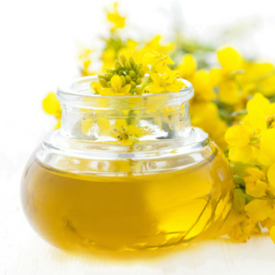
Recently I have read a myriad of misinformation on organic canola oil on the internet. There’s also a myriad of truthful information out there, but sometimes it’s hard for the average consumer to know what is correct, because everyone — on both sides — is only trying to share the truth as they know it.
As food manufacturers, it is our duty to our customers to be able to explain the ingredients used, so if you’re using organic canola (or thinking about it) here’s how to answer one of the more common questions you’re going to get.
Or if you’re a consumer reading this, here’s the background to your burning question.
I’ve gotten this one multiple times myself: how can organic canola oil exist, if certified organic products can’t be genetically modified, and canola oil is — by its very nature — genetically modified from the rapeseed plant?
That is right where we will start, because that’s right where the first misunderstanding begins. Because canola was never actually genetically modified from rapeseed to begin with.
Canola Was Traditionally Bred From Rapeseed Plants
 When first produced, canola oil was an off-branch of it’s cousin known as Rapeseed (Brassica napus L.). Rapeseed has a high level of erucic acid and is not safe for consumption.
When first produced, canola oil was an off-branch of it’s cousin known as Rapeseed (Brassica napus L.). Rapeseed has a high level of erucic acid and is not safe for consumption.
The plants now used to make canola oil are from a different variety, known as canola plants, that have a much lower level of erucic acid. These canola plants are the result of the hybridization the rapeseed plant back in the 70's. Some varieties of canola are hybrid and some are open pollinated; both of these are the result of traditional breeding that happened decades ago, not genetic engineering.
This kind of “traditional” plant breeding is similar to crossing a brown chicken with a white chicken to get a speckled brown-and-white chicken. Then you cross that speckled chicken with a brown chicken, and down through the generations it goes, imparting more and more of the genes that you’re choosing to breed. After so many generations, the final result can be so different from the original that a new name is warranted to help differentiate.
As a horse person, this example was easier for me to understand: Thoroughbred race horses, as they are known today, actually were developed in the 1600-1700’s, when Arabian, Barb and Turkoman breeds were combined to create a new breed ideal for racing. The old breeds were combined and ideal genes were selected, and eventually a new breed was established.
Well that’s exactly what happened with the canola oil — rapeseed was intentionally bred and bred again, until the fat content changed to be exactly what they wanted: higher levels of safe and healthier monounsaturated fats in the form of oleic acid, and less in the form of erucic acid.
Snopes (the truth-finding independent website) discusses these developments in breeding in more detail:
“In 1974, rapeseed varieties with a low erucic content were introduced. Scientists had found a way to replace almost all of rapeseed’s erucic acid with oleic acid, a type of monounsaturated fatty acid. (This change was accomplished through the cross-breeding of plants, not by the techniques commonly referred to as “genetic engineering.”)
By 1978, all Canadian rapeseed produced for food use contained less than 2% erucic acid. The Canadian seed oil industry rechristened the product “canola oil” (Canadian oil) in 1978 in an attempt to distance the product from negative associations with the word “rape.”
Canola was introduced to American consumers in 1986. By 1990, erucic acid levels in canola oil ranged from 0.5% to 1.0%, in compliance with U.S. Food and Drug Administration (FDA) standards.” Source
Some Canola Seeds Were Genetically Engineered Later
Genetic engineering came into play years later as these canola plants were genetically modified to be tolerant to Roundup and also to produce Bt toxins that are toxic to certain insects. This genetic engineering involves splicing genes, and the specific purpose was to make this crop less susceptible to insects and disease.
It’s important to understand that the crops didn’t morph from rapeseed to canola using genetic engineering -- that happened through a natural breeding hybridization process.
Therefore, it’s not in canola’s “life blood” that it is a genetically engineered oil at it’s foundational level.
Some Canola Remains Non-GMO — And Never Has Been Genetically Modified
When genetic modification gained popularity in the 90s, not all canola seeds were genetically modified — there were plant strains that remained untouched. Those are just the seeds now being used for all of the Non-GMO Project Verified Canola Oil and in Organic Canola Oil (which can not use seeds that have been genetically modified).
The USDA National Organic Program actually outlaws the use of GMOs in any organic products: “The use of GMOs is prohibited in organic production and handling.” You can read the USDA NOP Organic guidelines here which outlaw GMOs and require programs for GMO avoidance to be in place.
The Non-GMO Project also heavily vets and genetically tests the products that their seal appears on, so if you have wondered how it’s possible that they are verifying organic and non-GMO canola oil, this is how. These particular seeds are, in fact, naturally non-GMO and always have been.
Backed By The USDA National Organic Program and The Non-GMO Project
I have heard "conspiracy-theory"-like claims that any Organic Canola Oil which bears the USDA NOP seal is simply lying — that it can’t be non-GMO or organic. And that the same applies to canola products with the Non-GMO Project Verified seal. This claim is absolutely 100% false.
I promise you, the USDA National Organic Program AND the Non-GMO Project Verified team is not lying and putting their seals on something that is actually genetically modified. Their companies exist primarily to keep information on what is in food and how it’s made, public to the consumer. Their reputation depends on it.
 The Non-GMO Project’s primary job is to show you what contains GMOs and what does not. And they use science and detailed quality control processes to back themselves up. As a manufacturer, you can’t use their seal without their approval, and that approval requires facility audits, paperwork trails and genetic testing to ensure that every product that uses their seal doesn’t have any GMOs in it.
The Non-GMO Project’s primary job is to show you what contains GMOs and what does not. And they use science and detailed quality control processes to back themselves up. As a manufacturer, you can’t use their seal without their approval, and that approval requires facility audits, paperwork trails and genetic testing to ensure that every product that uses their seal doesn’t have any GMOs in it.
In summary, if you see Organic or Non-GMO Canola Oil and wonder — how can this even exist? It can.
What Do I Have To Gain In Sharing This?
Some will say in retort to this article — she’s just saying this “propaganda” to make money or support big business. However, here’s the thing: as a small start-up company 7 years ago, I support neither the canola industry or “big ag" in particular. And we sell at least 30 different kinds of oil, so I have no personal gain if I sell more canola oil over other oils.
I could easily steer natural food manufacturers away from it as I could open the door towards it — and depending on the situation, I have taken both sides.
What personally drives me to share this is the need to see accurate information spread. I have no problem sharing negative information about canola or any other oil if it’s true — but the truth is the primary point for me.
Tell the truth, tell the truth, tell the truth — that’s my mantra.
Topics: Organic, Canola Oil













